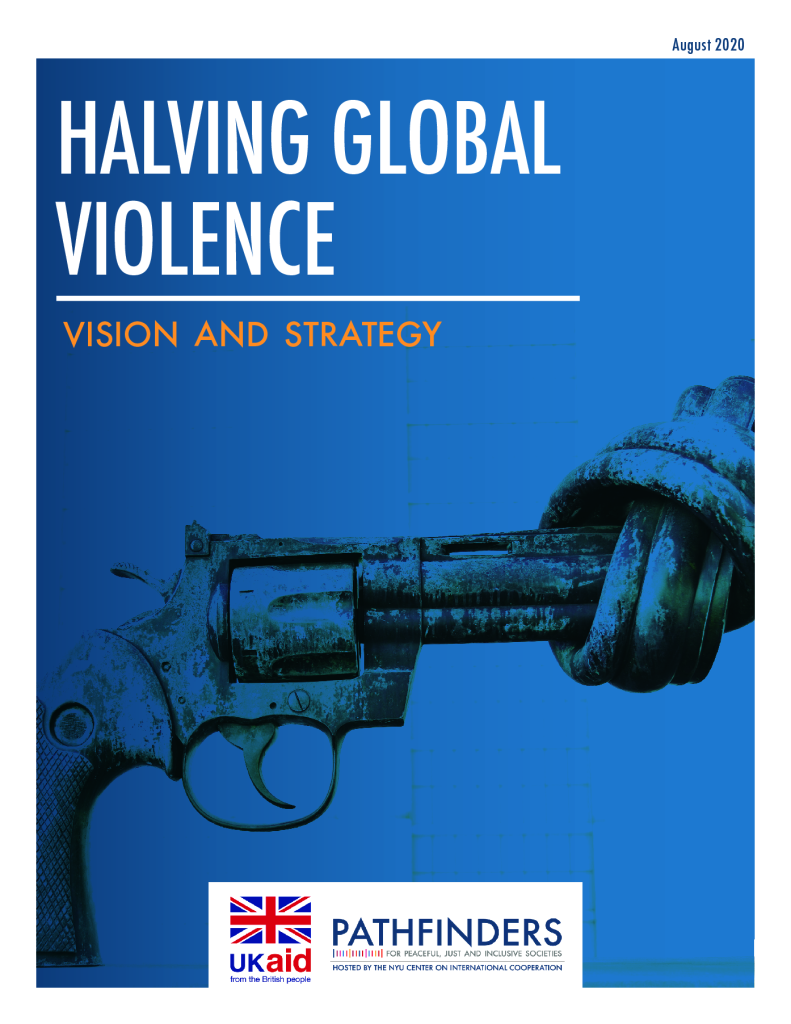Halving Global Violence: Vision and Strategy

Can we halve global violence in a post- COVID-19 world? With the onset of COVID-19, the world is entering a volatile, unstable and disorderly phase. The COVID-19 pandemic is not only overwhelming health systems. It is set to generate the worst global economic downturn since the 1930s and it is widely expected that these disruptions will generate economic hardship, particularly among informal workers and vulnerable populations. Although the current focus on the health emergency and economic fallout is warranted, rising unemployment, food insecurity and spreading grievances mean that security will soon dominate the global agenda. More than ever, in this time of COVID-19, the international community must focus on peace and security.
Delivering on the 2030 Agenda, including significantly preventing and reducing violence, has become even more challenging in the context of COVID-19. Research conducted for this strategic paper before the COVID-19 outbreak indicated that overall levels of violence would worsen between 2020 and 2030 in a
‘business as usual’ scenario. If early intervention is undertaken it is more likely that the number of countries affected by armed conflict and organized violence could decline. The economic returns of halving conflict violence alone by 2030 are significant – up to $2 trillion dollars. This strategic paper also highlights future trends for interpersonal violence. It finds that homicide rates will continue drifting upward, especially in Latin America and the Caribbean, if actions are not taken immediately. The positive news is that violence is not inevitable – there are options to prevent and decrease it at this critical juncture. Moreover, we have more knowledge and tools to help prevent conflict, reduce crime, and disrupt violence against women and children than ever before.
The Pathfinders is committed to launching and supporting a global movement to halve violence by 2030. We have already developed a framework of commitments, evidence of how to achieve them, and have gathered examples of successful implementation. This is not a radical proposition. Specifically, there is a binding political commitment by UN member states in SDG 16.1 requiring signatories to, “significantly reduce all forms of violence and related death rates everywhere.” States have also agreed in SDG16.2 to, “eliminate all forms of violence against all women and girls in the public and private spheres, including trafficking and sexual and other types of exploitation” and “end abuse, exploitation, trafficking and all forms of violence against and torture of children.” Moreover, there are many examples of countries and cities that have, with the right combination of leadership, interventions, resourcing and monitoring, delivered significant reductions in violence in a short period of time. Halving violence is possible; indeed, it has never been more important, given the threat multiplier of COVID-19 and the urgency of investing in violence reduction and prevention as a bulwark against insidious losses to the pandemic. The question is whether, and how, the appropriate level of political will and economic investment can be mustered.
The Pathfinders is helping to support a broad coalition of partners working across multiple fields and sectors to reduce violence by 50 percent over the next ten years. To accomplish this, Pathfinders is partnering with a variety of national governments, city authorities, international, national and grassroots non-governmental organizations, as well as business and philanthropic groups to first ensure that this goal is prominent on the global agenda, and then to scale-up concrete and practical investments at the national and city scale over the coming decade. The coalition is determined to prevent and reduce multiple categories of violence–including conflict and armed violence, urban and criminal violence, interpersonal violence (including violence against women and children), mass atrocities, and extremism. To this end, Pathfinders aims to bolster existing efforts and build support for newer ones between 2020 and 2030.
The preliminary groundwork for the movement was set out at the initial meeting of experts, practitioners, and officials hosted by the Pathfinders and Wilton Park in the summer of 2020. The gathered participants agreed that recruiting a variety of political champions facing different violence challenges under the banner of a movement, supporting local solutions, and doubling down on finance for interventions that have proven to work are essential next steps in the movement’s formation and launch.
This product was funded with UK aid from the UK government.
Related Resources
